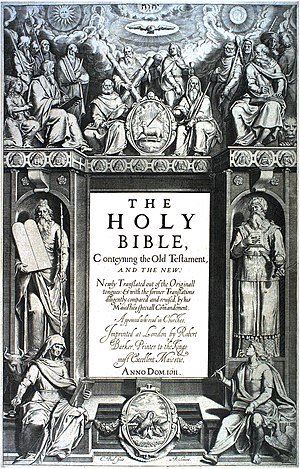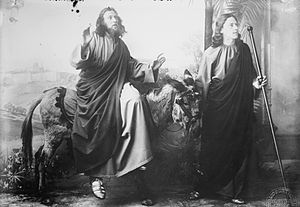 Image via WikipediaI. THE NATURE OF FAITH
A. What faith is ..
Image via WikipediaI. THE NATURE OF FAITH
A. What faith is ...
“the substance of things hoped for” Heb. 11:1 (
KJV)
implies hope - enables the believer to understand that the things hoped for are a present spiritual reality.
“the evidence of things not seen” (KJV)
having faith, in itself, provides evidence of the reality of the unseen things and faith enables the believer to understand that these things are real.
1. Faith is the opposite of unbelief.
“Whatsoever is not of faith is sin.” Rom. 14:23 (KJV)
Unbelief is really the worst sin, since it results in ultimate separation from God.
2. Faith is equated with righteousness: “Abraham believed God and it was reckoned to him as righteousness.” Rom. 4:3 (
NASB) (quoting from Gen. 15:6)
3. Belief / Assent - involves knowledge
4. Trust - entrusting yourself to Christ
B. Christian faith is not blind faith,
but is rooted in historical events and a real person who lived on earth at a specific time and place. It is based on the assurances of God's Word, which is accepted as His supernatural revelation of Himself, and thus is entirely trustworthy and reliable.
Faith is not an attempt to believe something reason tells us is untrue. The early disciples knew they had good grounds for their belief.
C. Where faith comes from: God, through the Holy Spirit
1. You have enough faith to be saved.
2. You need to act upon your God-given faith (“seeking” faith that drives one to prayer)
Examples: Jacob - Gen.32:26 “….I will not let you go unless you bless me.”(NASB)
Nobleman - John 4:49-52 “…Sir, come down before my child dies.”
“…Go your way. Your son lives.”
“….Yesterday at the seventh hour, the fever left him.”
3. Faith grows from prayer, fellowship with God, hearing God's Word.
Example: Samuel “Speak, Lord, for thy servant heareth.” (I Sam. 3:9, KJV)
4. Faith leads to obedience: Example: Abraham
5. Faith leads to victorious accomplishments for God: Examples: Paul, Samson, Gideon
D. Faith is not understood or accepted by the world.
It is misunderstood, identified variously as superstition or misguided idealism.
The “scientific” or secularist world view which gives rise to this misunderstanding is essentially a failure to understand the nature and reality of God. God doesn't think like they do! But God created out of nothing the things the materialists know.
Heb. 11: 3 - “By faith we understand that the worlds were prepared by the word of God, so that what is seen was not made out of things which are visible.” (NASB)
II. THE TESTING AND RESULTS OF FAITH
A. Faith leads to
1. Salvation
2. Obedience
3. Good works
4. Power to live the Christian life
"Walk with God" - Enoch
5. Final victory in Christ
B. Faith is tested and proven.
1. Without adversity, there is no test of faith.
2. Faith does not demand signs and wonders, but instead is what there is when the miracle doesn't come.
3. The faith of the Christian will be tested.
Examples: Job, Stephen, Paul
C. Faith is the victory which overcomes the world. (I John 5:4)
Overcoming = not compromising
Example: Noah
D. Hindrances to faith
1. Lack of prayer
2. Lack of participation in church
3. Demand to see signs and wonders
“An evil and adulterous generation craves for a sign…” (Mt. 12:39, NASB) Presumably, if no sign is given, there is an excuse for unbelief.
Example of not requiring a sign: Daniel's friends Hananiah, Mishael, and Azariah (Hebrew names), a.k.a. Shadrach, Meshach, and Abed-nego (Babylonian names):
Dan. 3:17 -18 - “If it be so, our God whom we serve is able to deliver us from the furnace of blazing fire; and He will deliver us out of your hand, O king. But even if He does not, let it be known to you, O king, that we are not going to serve your gods or worship the golden image that you have set up.” (NASB)
a. Must see quick results
b. Must have right feeling
c. Must be delivered immediately from all troubles
4. Failure to observe what God has done
a. Offer of salvation
b. Blessings of life
c. Answer to prayer
III. THE REWARDS OF FAITH
A. Jesus' healings often were acknowledgments of faith.
Mt. 9:20-22 - Woman with a flow of blood: “….Be of good cheer, daughter. Your faith has made you well…” (
NKJV)
Mt. 9:27-29 Blind men: “….According to your faith let it be to you.” (NKJV)
Lk. 7:2-9 Centurion's servant: “….I say to you, I have not found such great faith, not even in Israel.” (NKJV)
B. Faith enables a person to find God and to please God.
Heb. 11:6 - “But without faith it is impossible to please Him, for he who comes to God must believe that He is, and that He is a rewarder of those who diligently seek Him.” (NKJV)
C. Eternal rewards listed in Revelation include
Eat of the tree of life (eternal life) 2:7
“….Be faithful unto death, and I will give you the crown of life.” (2:10, NASB)
Hidden manna 2:17
White stone / new name 2:17
Authority to rule 20:6
Be a pillar in the temple of God 3:12
Sit down with Jesus on His throne 3:21
IV. BUILDING YOUR FAITH
A. Build your faith by practicing it.
1. Continue in prayer.
2. Don't give up. “Though he slay me, yet will I trust in him” (Job 13:15, KJV)
3. Practice obedience.
“You are my friends if you do what I command you. No longer do I call you slaves, for the slave does not know what his master is doing, but I have called you friends, for all things that I have heard from My Father I have made known to you." (John 15:14-15, NASB)
B. Share your faith with others, especially your own household.
1. “Believe on the Lord Jesus Christ, and thou shalt be saved, and thy house.” (Acts 16:31, KJV)
2. “But if anyone does not provide for his own, and especially those of his household, he has denied the faith, and is worse than an unbeliever.” (I Tim. 5: 8, NASB)
C. Faith affects all relationships.
D. Don't spare the effort. Let your actions demonstrate faith!
Illustration: Title page to the 1611 first edition of the Authorized (King James) Version of the Bible. Public domain.
 Image via WikipediaBEHOLD THE LAMB OF GOD
Image via WikipediaBEHOLD THE LAMB OF GOD 







